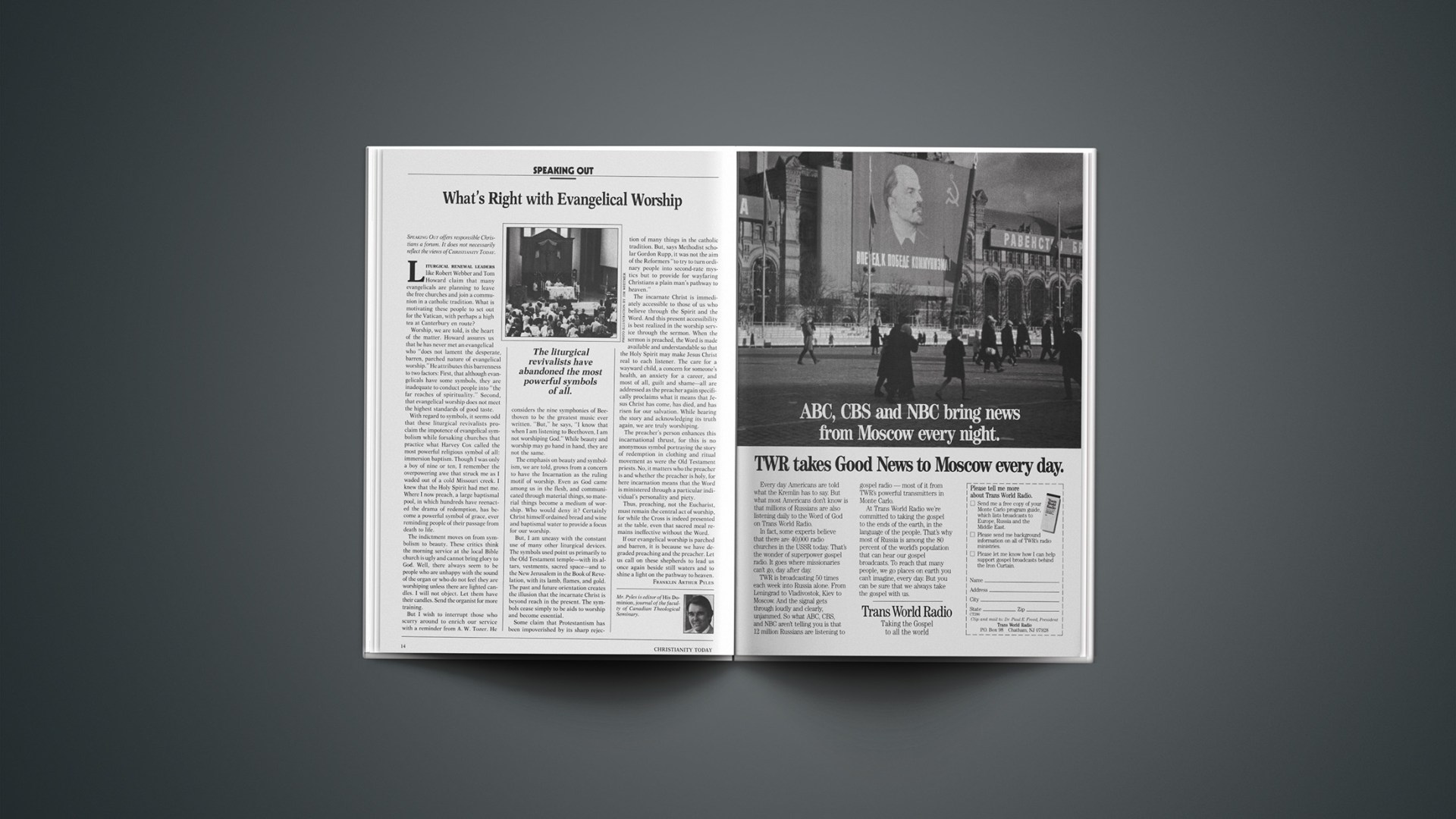SPEAKING OUT offers responsible Christians a forum. It does not necessarily reflect the views of CHRISTIANITY TODAY.
Liturgical renewal leaders like Robert Webber and Tom Howard claim that many evangelicals are planning to leave the free churches and join a communion in a catholic tradition. What is motivating these people to set out for the Vatican, with perhaps a high tea at Canterbury en route?
Worship, we are told, is the heart of the matter. Howard assures us that he has never met an evangelical who “does not lament the desperate, barren, parched nature of evangelical worship.” He attributes this barrenness to two factors: First, that although evangelicals have some symbols, they are inadequate to conduct people into “the far reaches of spirituality.” Second, that evangelical worship does not meet the highest standards of good taste.
With regard to symbols, it seems odd that these liturgical revivalists proclaim the impotence of evangelical symbolism while forsaking churches that practice what Harvey Cox called the most powerful religious symbol of all: immersion baptism. Though I was only a boy of nine or ten, I remember the overpowering awe that struck me as I waded out of a cold Missouri creek. I knew that the Holy Spirit had met me. Where I now preach, a large baptismal pool, in which hundreds have reenacted the drama of redemption, has become a powerful symbol of grace, ever reminding people of their passage from death to life.
The indictment moves on from symbolism to beauty. These critics think the morning service at the local Bible church is ugly and cannot bring glory to God. Well, there always seem to be people who are unhappy with the sound of the organ or who do not feel they are worshiping unless there are lighted candles. I will not object. Let them have their candles. Send the organist for more training.
But I wish to interrupt those who scurry around to enrich our service with a reminder from A. W. Tozer. He considers the nine symphonies of Beethoven to be the greatest music ever written. “But,” he says, “I know that when I am listening to Beethoven, I am not worshiping God.” While beauty and worship may go hand in hand, they are not the same.
The emphasis on beauty and symbolism, we are told, grows from a concern to have the Incarnation as the ruling motif of worship. Even as God came among us in the flesh, and communicated through material things, so material things become a medium of worship. Who would deny it? Certainly Christ himself ordained bread and wine and baptismal water to provide a focus for our worship.
But, I am uneasy with the constant use of many other liturgical devices. The symbols used point us primarily to the Old Testament temple—with its altars, vestments, sacred space—and to the New Jerusalem in the Book of Revelation, with its lamb, flames, and gold. The past and future orientation creates the illusion that the incarnate Christ is beyond reach in the present. The symbols cease simply to be aids to worship and become essential.
Some claim that Protestantism has been impoverished by its sharp rejection of many things in the catholic tradition. But, says Methodist scholar Gordon Rupp, it was not the aim of the Reformers “to try to turn ordinary people into second-rate mystics but to provide for wayfaring Christians a plain man’s pathway to heaven.”
The incarnate Christ is immediately accessible to those of us who believe through the Spirit and the Word. And this present accessibility is best realized in the worship service through the sermon. When the sermon is preached, the Word is made available and understandable so that the Holy Spirit may make Jesus Christ real to each listener. The care for a wayward child, a concern for someone’s health, an anxiety for a career, and most of all, guilt and shame—all are addressed as the preacher again specifically proclaims what it means that Jesus Christ has come, has died, and has risen for our salvation. While hearing the story and acknowledging its truth again, we are truly worshiping.
The preacher’s person enhances this incarnational thrust, for this is no anonymous symbol portraying the story of redemption in clothing and ritual movement as were the Old Testament priests. No, it matters who the preacher is and whether the preacher is holy, for here incarnation means that the Word is ministered through a particular individual’s personality and piety.
Thus, preaching, not the Eucharist, must remain the central act of worship, for while the Cross is indeed presented at the table, even that sacred meal remains ineffective without the Word.
If our evangelical worship is parched and barren, it is because we have degraded preaching and the preacher. Let us call on these shepherds to lead us once again beside still waters and to shine a light on the pathway to heaven.
FRANKLIN ARTHUR PYLES1Mr. Pyles is editor of His Dominion, journal of the faculty of Canadian Theological Seminary.










